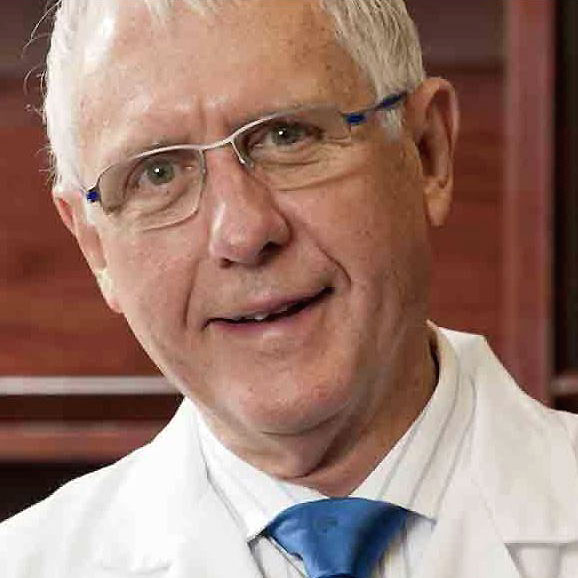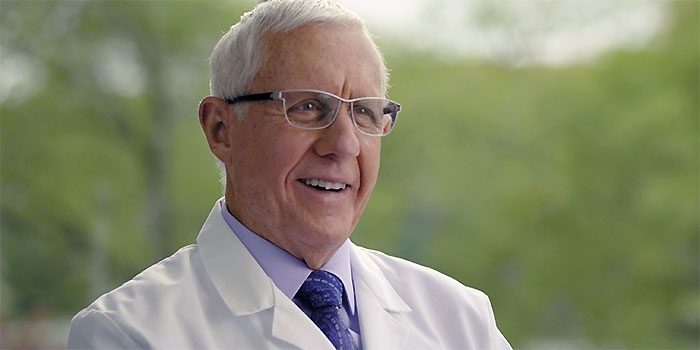


Loving parents, caring family physicians and vague memories of his grandmother's breast cancer diagnosis have helped to build the foundation of Dr. Stephen Ray’s life and career.
If life has taught Stephen Ray, MD, anything, it’s to be all in. No matter the task. No matter the goal.
“My dad had a philosophy: If you can’t do it right, don’t even start,” he says. “He taught me from an early age whether it was mowing the grass or digging a hole for a mailbox, you did it just right.”
This was not just talk in young Stephen Ray’s world. It was a philosophy that was at the foundation of upbringing.
He saw those words in action as his father built the family home—nearly single-handedly. He saw them in is mother, who took the time and care to prepare healthy meals and school lunches. He experienced that philosophy with his family’s doctors, who “were very strong figures.” And he witnessed it in his parents and the doctors who cared for his grandmother when she was diagnosed with breast cancer.
Dr. Ray credits his parents, who were tremendously hard-working, industrious, loving and ahead-of-their-time in many ways, as well as the family’s physicians, with influencing his career choices. Their lessons would become the cornerstone of his life’s work as a successful reconstructive breast cancer surgeon at City of Hope Chicago and to help patients navigate their cancer treatment.
Stephen J. Ray was born in Southern California and raised in Altadena, a scenic suburb of Los Angeles in the Verdugo Mountains.
His mother was an artist and a “loving, caring woman,” he says. “I think every cell in her body was infused with love. She was a strong Christian woman who read the Bible every day and just had a nurturing presence about her.”
His father trained as a machinist and was a tireless, “self-made man,” Dr. Ray says. He built the family’s home from the ground up in the evenings and weekends while working full time.
“He would go to the lumber yard and bring back lumber on his bicycle,” Dr. Ray recalls. “We lived in a tent for almost a year while he built the house, but I just felt it was an adventure. We would go sleep in the neighbor’s garage when there was a storm.”
The resulting house “turned out fine; a very pleasant house to live in,” Dr. Ray says. “One of the things that I learned from my dad was a willingness to take on tough challenges and just stick with it.”
His father later worked as a supervisor for a large aerospace company that produced rocket components. Although he had no formal engineering training, the engineers would consult with him on the design of the rocket components.
He would “look at the drawing the engineers did and tell them whether it would work on not,” Dr Ray says. “At first they didn’t believe that he could do that. But after he demonstrated that, they could always come show him the components they wanted to build and he would tell them whether it would work or not. He was inherently smart, my dad.”
His father also was a professional photographer who spent time learning with Ansel Adams, Dr. Ray says.
Dr. Ray’s mother was ahead of her time in ensuring healthy foods for her family. She baked whole grain breads from scratch rather than buying baked goods at the store. And she made sure her children had plenty of fresh fruits and vegetables.
“She was into health food before health food was even talked about,” Dr. Ray says. “I know my lunches at school were different than all the other kids. I was the one that had sandwiches with whole wheat bread and cut up vegetables and fruit.”

When he was in second grade, Dr. Ray’s grandmother was diagnosed with breast cancer. While the memories are vague, he remembers his family’s concern and the authoritativeness and compassion of the physicians caring for his grandmother. And, although he was just a child at the time, the memories of the care his family received is at the root of how he would treat his own breast cancer patients decades later.
“I used to accompany my grandfather and my mother to the hospital and I can remember just as a little kid the concern that they had and all the hours that they spent at the hospital,” he says. “I think that stuck with me.
“When we meet with someone we really spend a lot of time listening to understand what they know about what's going, what we know about what's going and what's their comfort level. That's wrapped in the fact that we really care about them during this process and they know that and they feel relieved.”
He also recalls positive experiences when visiting two of the family’s doctors, who were “very caring physicians.” His experiences with these doctors as he grew into his teen years were pivotal in his later career choices, he says.
“When I would have physical problems or emotional problems, my parents would take me and they would talk with me. And I always felt better afterwards,” he says. “And interestingly enough, they were both surgeons. I think they probably had some role in influencing me to make a decision to go into medicine.”
As a teenager, Dr. Ray, was a good student, but he also developed a passion for long-distance road cycling. And, as his father had instilled in him, he was all in on the sport, pedaling 100 to 300 miles each week.
“I would get up early in the morning and leave home and go right up in the mountains before I rode to high school,” he recalls. “[My parents] thought I was hurting my health, and my physician told me to back off.”
But he was relentless and determined to push himself the limit. Although he had dreams of taking time between his junior and senior years in high school to train for the Olympic cycling team (one of his mentors was an Olympic cycling coach, who had encouraged him to try out), he ultimately decided not to pursue that path.
“I don’t regret doing what I did, but I wished I’d taken the year out and tried to get on the Olympic team,” he says. He adds that he also was interested in long-distance speed skating, and several of his skating buddies did go on to compete in the Olympics.
True to his work ethic, when Dr. Ray wasn’t in school or pursuing his athletic passions, he was working at jobs refinishing kitchens, painting houses or doing landscaping work.
“I always had jobs,” he says.
When it came time to apply for college, he had heard good things about the University of California at Berkeley. He applied to Berkeley — no other colleges or universities — without ever visiting the campus. And his acceptance to one of the best universities in the country was greeted rather matter-of-factly by his family.
“My mother called me one day and said, ‘you got a postcard from Berkeley [that] says you’ve been accepted,’ and I was like, ‘oh, good. OK.’ And off I went.”
Initially, Dr. Ray majored in child psychology and wanted to be a child psychiatrist. He even worked at the Langley Porter Neuropsychiatric Institute in San Francisco one summer while in medical school.
“I absolutely love kids,” Dr. Ray says. “Berkeley had just a wonderful developmental psychology department. They had a daycare center that was set up so that as a psychology student you could go in and observe kids; interview them; give them IQ tests or behavioral tests as part of your education. It was just a great place to go to school.”
But his surgical rotation during medical school changed his outlook and cemented his desire to become a surgeon. Part of that third-year rotation involved several reconstructive surgeons who were particularly influential, Dr. Ray remembers.
“I was absolutely fascinated by reconstructive surgery,” he says. “And I didn’t even want to take surgery in medical school. I just didn’t care for surgeons.”
But, looking back, the transition from psychiatry to surgery was a logical development, he says. “You know there are so many psychological issues associated with people who need surgery. I was entranced with the fact that you could do something technical and you could deal with all the psychological components. That’s what really drew me to it.”
Taking the open-minded approach instilled in him as a child, Dr. Ray melded his interest and background in psychiatry with the technical aspects of reconstructive surgery. He even, through the years, has added his own unique twist incorporating acupuncture and is certified in medical acupuncture.
The emotional aspect of treatment “almost outweighs my interest in doing the surgery itself,” Dr. Ray says. He adds that what is most exciting and rewarding is “taking someone who has gotten a diagnosis that’s potentially lethal and guiding them through all of the thought processes that you have to go through to come up with understanding what you have, what your options are and how to choose a treatment path that fits both the tumor and your belief system. It’s sort of a challenge that utilizes all my talent and I love it.”
While the precision and technical aspects of surgery are appealing to him, Dr. Ray says the integrated holistic approach to benefit his patients is truly his passion.
“I give thanks to God that I have the skill set that I do and I’m in a setting where I can work with people and have the experience of trying to bring hope and healing to people,” he says. “It’s a privilege to do what I do. I’m very grateful for that privilege.”
His career as a surgeon also put him on the path of meeting his wife Ilya. The pair met at the hospital while Ilya was a nurse navigator for breast cancer patients.
“Now she is my life navigator,” Dr. Ray says.
After they were married, Ilya went back to school and is currently a certified psychiatric nurse practitioner.
“For the past 14 years Ilya and I have been raising our delightful, and occasionally challenging, granddaughter,” Dr. Ray says. “We both have a wonderfully rewarding life at work and home and thank God daily for the multitude of blessings life has brought us.”